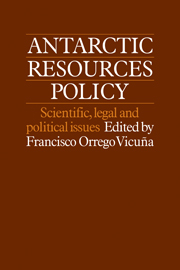Book contents
- Frontmatter
- Contents
- List of contributors
- 1 Antarctic resources policy: an introduction
- Part one The state of Antarctic knowledge and experience
- Part two The policy for the conservation of the living resources of Antarctica
- Part three The policy for the exploration and exploitation of the mineral resources of Antarctica
- 11 Geologic data and its impact on the discussion on a regime for mineral resources
- 12 Basic conditions for the exploration and exploitation of mineral resources in Antarctica: options and precedents
- 13 Oil as a special resource: problems and experiences
- 14 An overview of the problems which should be addressed in the preparation of a regime governing the mineral resources of Antarctica
- 15 The definition of a regime on Antarctic mineral resources: basic options
- 16 Criteria for access to the resources of Antarctica: alternatives, procedure and experience applicable
- Part four Issues on Antarctica and the law of the sea
- Part five The policy for Antarctic cooperation
15 - The definition of a regime on Antarctic mineral resources: basic options
Published online by Cambridge University Press: 06 July 2010
- Frontmatter
- Contents
- List of contributors
- 1 Antarctic resources policy: an introduction
- Part one The state of Antarctic knowledge and experience
- Part two The policy for the conservation of the living resources of Antarctica
- Part three The policy for the exploration and exploitation of the mineral resources of Antarctica
- 11 Geologic data and its impact on the discussion on a regime for mineral resources
- 12 Basic conditions for the exploration and exploitation of mineral resources in Antarctica: options and precedents
- 13 Oil as a special resource: problems and experiences
- 14 An overview of the problems which should be addressed in the preparation of a regime governing the mineral resources of Antarctica
- 15 The definition of a regime on Antarctic mineral resources: basic options
- 16 Criteria for access to the resources of Antarctica: alternatives, procedure and experience applicable
- Part four Issues on Antarctica and the law of the sea
- Part five The policy for Antarctic cooperation
Summary
The definition of a regime on Antarctic mineral resources has begun to be the object of discussion both among the Consultative Parties to the 1959 Treaty, and, from a more general standpoint, among third-party countries and other circles concerned with the problem. While many studies suggest that the exploitation of these resources is not as near at hand as is commonly believed, and that perhaps its economic interest or yield will not be very great, a certain climate of expectation has nevertheless grown up around the subject, as happened, at its time, with the mineral resources of the sea-bed. It is on this basis that various alternatives and options are starting to be propounded, in connection with aspects ranging from the nature of the Antarctic system to consideration of specific regimes for the regulation of the activity in question. The present article will discuss some basic options in the light of what seem to be the prevailing trends.
The nature of the system and the limits of internationalization
There has been a great deal of speculation of late as to possible initiatives aimed at applying to the Antarctic continent the concept of the common heritage of mankind; sporadic references to this approach having been made in the United Nations. This point of view undoubtedly represents an extreme form of internationalization, grounded on the precedent of the regime for the mineral resources of the sea-bed.
- Type
- Chapter
- Information
- Antarctic Resources PolicyScientific, Legal and Political Issues, pp. 199 - 216Publisher: Cambridge University PressPrint publication year: 1983
- 1
- Cited by



